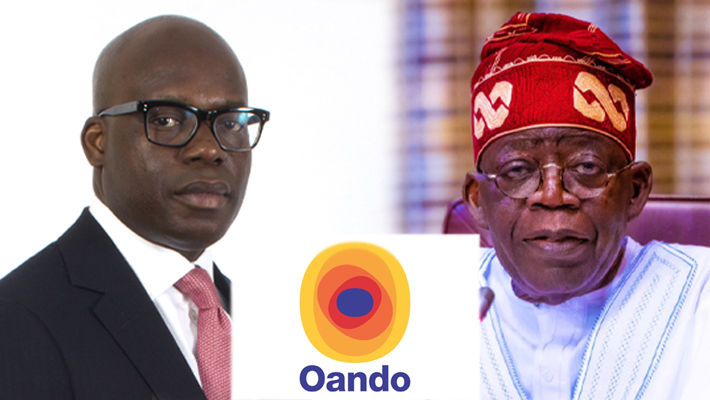
The market value of Oando Plc —run by Nigerian President Bola Tinubu’s nephew, Wale Tinubu, —soared to record highs from ₦74 billion in 2023 to N1 trillion as of September 2024, indicating more than 1,000 per cent increase in valuation as Nigeria battled its worst cost-of-living and fuel crises.
While the country was recording an exodus of multinational companies like pharmaceutical giant GlaxoSmithKline (GSK), Microsoft, and Diageo (Guinness parent company) due to Nigeria’s harsh economic climate, Oando was leaving the league of companies generating billions of naira in revenue to 12 zeroes.
Oando —an average-performing oil company before President Tinubu’s government— recorded ₦74 billion profit after tax in the financial year ended 2023, a stark contrast to the previous year when it recorded a loss after tax, according to Peoples Gazette.
But just a little over one year after Bola Tinubu became president, the company’s share price, which sold at six naira as of September 1, 2023, saw its market value rocket to an all-time high of ₦92.
The latest valuation elevated Oando to the top 10 most-capitalised companies on the Nigerian stock exchange.
The profit surge comes months after a Peoples Gazette’s January report exposed how Tinubu was plotting to transfer Eni’s Nigerian assets to Oando in exchange for Eni’s repossession of Nigeria’s lucrative OPL 245 oil field in partnership with Shell.
The assets transfer was made public last week by the parties, who said the deal was about $785 million and denied any wrongdoing of Oando cornering juicy deals at the expense of Nigeria’s oil field.
Wale Tinubu and Oando have continued to deny any wrongdoing, asserting that some of the discussions that led to their latest successes took place long before his uncle assumed office.
The increase sent netizens into a frenzy with many attributing Oando’s profit surge to its CEO’s blood ties with the president, suggesting the oil company’s increased valuation resulted from President Tinubu’s influence and not necessarily hard work and merit.
Oando Plc could not be reached for comment.
The currency devaluation, fuel subsidy removal and overall economic crisis had sent many companies into dire straits, including billionaire Aliko Dangote, who recently got demoted from Africa’s richest man to the second position, according to rankings of Bloomberg Billionaire Index released in August.
Oando is not the only business with ties to the Tinubu family that is doing well under the current administration. Earlier this year, the president awarded a humongous road contract worth over ₦15 trillion to a company run by his son Seyi and his friend, Gilbert Chagoury.
The president awarded the multi-trillion naira Lagos-Calabar Coastal highway project contract to Gilbert Chagoury’s company, Hi-tech, in which First Son Seyi Tinubu sits on its board, a move that triggered furious reactions and nepotism accusations.
The collective outrage and criticism from opposition figures like Atiku Abubakar, the presidency denied nepotism or corruption accusations in handling federal contracts under the current administration.
Nigeria is facing its worst economic crisis in decades, with skyrocketing inflation, a national currency in free-fall and millions of people struggling to buy food. Only two years ago Africa’s biggest economy, Nigeria is projected to drop to fourth place this year.
The pain is widespread. Unions strike to protest salaries of around $20 a month. People die in stampedes, desperate for free sacks of rice. Hospitals are overrun with women wracked by spasms from calcium deficiencies.
Although President Bola Tinubu increased the minimum wage — after strike action and months-long negotiations with labour unions — from N30,000 to N70,000, his government has increased spending for officials at a time of nationwide starvation.
For workers earning the new N70,000, or $43, per month minimum wage, capricious inflation and naira value have inflicted too much damage for the changes to make any difference in their lives.
The crisis is largely believed to be rooted in two major changes implemented by Mr Tinubu, elected 14 months ago: the partial removal of fuel subsidies and the floating of the currency, which together have caused major price rises.
A nation of entrepreneurs, Nigeria’s more than 200 million citizens are skilled at managing in tough circumstances, without the services states usually provide. They generate their own electricity and source their own water. They take up arms and defend their communities when the armed forces cannot. They negotiate with armed kidnappers when family members are abducted.
But right now, their resourcefulness is being stretched to the limit.
Peoples Gazette contributed to this report
